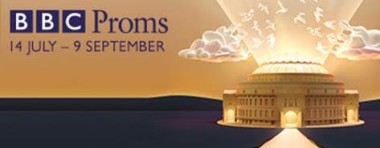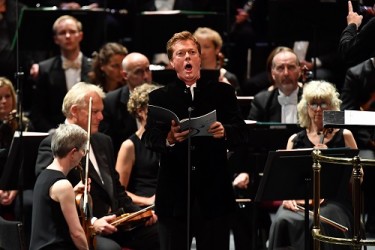
 United Kingdom 2017 BBC Proms 32 – Britten, Elias, Purcell, Elgar: BBC National Orchestra of Wales and BBC National Chorus of Wales/Ryan Wigglesworth, Leonard Elschenbroich (cello), Toby Spence (tenor), Henry Waddington (bass-baritone) Royal Albert Hall, London, 9.8.2017. (CST)
United Kingdom 2017 BBC Proms 32 – Britten, Elias, Purcell, Elgar: BBC National Orchestra of Wales and BBC National Chorus of Wales/Ryan Wigglesworth, Leonard Elschenbroich (cello), Toby Spence (tenor), Henry Waddington (bass-baritone) Royal Albert Hall, London, 9.8.2017. (CST)

Britten – Ballad of Heroes
Brian Elias – Cello Concerto (2015)
Purcell – Jehova, quam multi sunt hostes mei, arr. Elgar
Elgar – Enigma Variations
The BBC National Orchestra of Wales’ final Prom of the 2017 season proved to be a compelling all British affair under the direction of Ryan Wigglesworth.
Benjamin Britten’s Ballad of Heroes is rarely heard, deeply imbued as it is with pre-echoes of the Sinfonia da Requiem that was to follow just a year later. From the mysterious foreboding of the opening off stage brass fanfares, which were delivered with darkly ominous gravitas, Ryan Wigglesworth found the perfect musical counter-balance for the dichotomy of Britten’s texts which skilfully pit the pacifist inclinations of WH Auden against the stark call to arms of Randall Swingler. Although cast in three sections, the work plays out continuously and with the chanting of the BBC National Chorus of Wales being perfectly enunciated through the opening section, Wigglesworth’s pacing and admirable control of tension, was matched by playing of magnificent technical clarity by the orchestra in the wildly virtuosic central ‘Dance of Death’. Tenor Toby Spence made his entry in the closing Recitative and Choral in bold, declamatory fashion, his words delivered with penetrating intensity as the music subsided and retreated ominously into the unease of the opening bars.
-

Toby Spence (tenor) performs Britten’s Ballad of Heroes
(c) Chris Christodoulou.
Brian Elias is no stranger to the Proms, with his first major orchestral canvas, L’Eylah, having been premiered as long ago as the 1984 season. His output is modest in size, the result of slow and painstaking craftsmanship, with every score being fashioned with obsessional attention to detail. His 2015 Cello Concerto was written for Natalie Clein although the intended soloist’s enforced withdrawal as a result of illness made Leonard Elschenbroich’s task of learning what is a complex, deeply impassioned score in the space of just two weeks all the more remarkable.
As with all Elias’s music, the structure is rigorously organised (a characteristic that owes much to the composer’s teachers Humphrey Searle and Elizabeth Lutyens), with the twenty-five minute score being generated almost in its entirety from the cello’s opening gesture, which in various forms and variants is audible throughout, binding the work with admirable aural clarity.
Like Oliver Knussen (whose operas Where the Wild Things Are and Higglety Pigglety Pop! Ryan Wigglesworth has directed at Aldeburgh), Wigglesworth brought a composer’s ear to Elias’s music, finding the score’s myriad colours and delicate, often shimmering crystalline textures with transparency and pristine attention to balance, aided in itself by the composer’s fastidious ear for detail in music that ranged from deeply felt, at times plangent lyricism to spectral like delicacy.
The unquestionable star here however was undoubtedly the soloist. For a score that was written with Natalie Clein in the forefront of the composer’s mind, Leonard Elschenbroich must have felt like a gift from God to Elias, delivering the immensely taxing solo part with searing intensity and passionate commitment, allied with a lightness of touch in the Leggerio second movement that amply emphasised the music’s extremes of atmosphere.
The contrast with Elgar’s orchestration of Purcell’s motet Jehovah, quam multi sunt hostes mei, that opened the second half of the concert could hardly have been more stark, with what is one of only two Latin motets composed by Purcell being given lavish treatment by Elgar in a telling demonstration of Elgar’s skill in scoring and instrumentation. Toby Spence was again impressive as the tenor soloist, joined by a darkly intoned bass-baritone Henry Waddington standing in for an indisposed Nicholas Perfect
From an arrangement that came late in Elgar’s creative life, it was a work of three decades earlier that brought the concert to a conclusion in Elgar’s Variations on an Original Theme.
The freshness and personality brought to the music by Ryan Wigglesworth was however evident from the opening bars as the conductor found a glorious romantic melancholy whilst using rubato to telling effect in Elgar’s affectionate portrait of his beloved wife Alice. Contrasted with the nimble agility of variation two, the boisterous fleeting picture of G.R. Sinclair’s bulldog Dan and the tender affection of Dorabella, Wigglesworth drew playing of great subtlety from his Welsh forces, beautifully characterising each variation whilst drawing to the fore the quirky personality traits that Elgar weaved so seamlessly into the score. Most telling of all however was the conductor’s response to Nimrod, in which the quietude of the opening bars made a deep impression, whilst emphasising what was a deeply personal response to Elgar’s music
It was a highlight of a concert that provided yet further evidence of the young composer/conductor’s rapidly increasing stature and prominence on the British musical scene.
Christopher Thomas